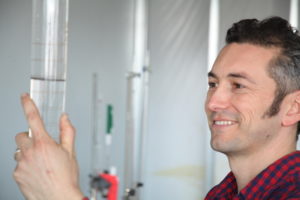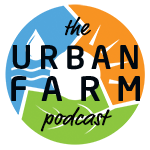489: Abraham Noe-Hays on Fertilizer from Urine.
Changing the world by reclaiming nutrients lost from our bodies.
In This Podcast:
What is your first thought when you think of using urine as fertilizer? Abraham Noe-Hays from the Rich Earth Institute may change your mind. Urine contains nitrogen, phosphorus, and potassium, all things that we look for in a fertilizer. They create pollution in our wastewater system, but when added to the agricultural cycle they benefit our plants. Listen in and learn about urine diversion, and you’ll honestly start to contemplate if you should begin peeing in your yard! Don’t Miss an Episode!! Click HERE to sign up for regular podcast updates
Our Guest:
 Abraham is the Research Director of the Rich Earth Institute. He coordinates multidisciplinary research and demonstration efforts involving farmers, scientists, planners, and volunteer participants (aka “urine donors”), with the goal of developing tools to allow other communities to start recycling urine. A lifelong resident of Vermont, he has used alternative sanitation systems since 1976, and has been academically and professionally involved in their development since 2000.
The Rich Earth Institute is an organization operating the nation’s first community-scale urine recycling program. This program converts human urine into fertilizer for use on local farms. The initiative saves water, prevents pollution, and supports sustainable agriculture by turning a universal waste product into a valuable resource.
Abraham is the Research Director of the Rich Earth Institute. He coordinates multidisciplinary research and demonstration efforts involving farmers, scientists, planners, and volunteer participants (aka “urine donors”), with the goal of developing tools to allow other communities to start recycling urine. A lifelong resident of Vermont, he has used alternative sanitation systems since 1976, and has been academically and professionally involved in their development since 2000.
The Rich Earth Institute is an organization operating the nation’s first community-scale urine recycling program. This program converts human urine into fertilizer for use on local farms. The initiative saves water, prevents pollution, and supports sustainable agriculture by turning a universal waste product into a valuable resource.
Listen in and learn about:
-
- How Abraham became a composting toilet designer and builder
- How they turn urine into fertilizer that can legally be used on farms
- How traditional fertilizer mine or synthesize the nitrogen, phosphorus, and potassium
- The impacts of urine in our current wastewater system
- The surprising statistic of how much nitrogen water pollution would be reduced if we took urine out of our wastewater
- How to use this water pollutant for good as a natural source for nutrients
- “Peak Phosphorus” and the discussion and geopolitical implications
- How they collect urine from their community and pasteurize and ready it for the agricultural cycle
- How they address pharmaceuticals in urine and how they impact crops
- What farmers say about urine fertilizer and what the supply and demand look like
- Using Reverse Osmosis to filter water and make more concentrated urine so they can store more with less space
- Freezing methods that produce a 10 times concentrated solution
- The process of starting a community-scale urine diversion project
- What the future could look like if cities adopted urine diversion
- The cost of wastewater treatment vs the cost of urine diversion
- The World Health Organization’s guidelines for using urine in your home garden
- Plant signs that they need additional nitrogen and how much urine will help those plants
- Odors and other considerations when using urine
As well as:
His failure – Most research is a process of failure!
His success – Forming an organization that answered a need but didn’t have much.
His drive – Intense curiosity and a desire to make things better and healthier.
His advice – Do the things you love and don’t spend too long in a situation you dislike.
Books written by Abraham and the Rich Earth Society:
“Guide to Starting a Community-scale Urine Diversion Program”
Abraham Book recommendations*:
“Sustainable Energy Without the Hot Air” by David MacKay
How to reach Abraham:
Website: richearthinstitute.org
Facebook: @Rich Earth Institute
Email: info@richearthinstitute.org
*Disclosure: Some of the links in this post are affiliate links and if you go through them to make a purchase, we will earn a nominal commission at no cost to you. We offer links to items recommended by our podcast guest as a service to our audience and these items are not selected because of the commission we receive from your purchases. The decision is yours, and whether you decide to buy something is completely up to you.UrbanFarm.org/peecycling



